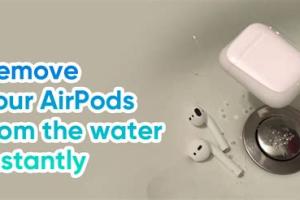Revive Your AirPods: A Comprehensive Guide to Fixing Water Damage

-
Quick Links:
- Understanding Water Damage in AirPods
- Immediate Steps to Take
- Drying Your AirPods: Best Practices
- Testing Your AirPods After Water Damage
- Long-Term Care Tips for Your AirPods
- When to Seek Professional Help
- Case Studies: Success Stories and Lessons Learned
- Expert Insights on AirPods Maintenance
- FAQs
Understanding Water Damage in AirPods
Water damage is a common issue faced by many AirPods users. When exposed to moisture, the internal components of AirPods can suffer severe effects, leading to audio issues or complete malfunction. Understanding how water affects your AirPods can help you take the right steps to fix them.
How Water Damages Your AirPods
Water can corrode the internal circuit boards and components, causing shorts and other malfunctioning behaviors. Even small amounts of moisture can lead to significant issues. AirPods are not waterproof, although they may be water-resistant to some extent.
Immediate Steps to Take
If your AirPods have been exposed to water, it’s crucial to act quickly. Here are the immediate steps you should take:
- Remove Them from Water: If your AirPods fell into water, retrieve them immediately.
- Turn Them Off: If they're still on, turn them off to prevent further damage.
- Dry the Exterior: Use a lint-free cloth to dry the exterior of the AirPods.
Drying Your AirPods: Best Practices
After the immediate steps, proper drying is essential. Here’s how to effectively dry your AirPods:
- Use Silica Gel Packs: Place the AirPods in a container filled with silica gel packs for 24-48 hours.
- Avoid Using Heat: Do not use a hairdryer or place them in direct sunlight.
- Do Not Charge: Avoid connecting them to a charger until they are completely dry.
Testing Your AirPods After Water Damage
Once you believe your AirPods are dry, it’s time to test them:
- Check for Audio Distortion: Listen for any unusual sounds or distortions.
- Test the Microphone: Make a call to see if the microphone is functioning correctly.
- Use Both AirPods: Ensure both earbuds are working independently.
Long-Term Care Tips for Your AirPods
To prolong the life of your AirPods and avoid future water damage, consider these care tips:
- Keep Away from Moisture: Avoid using them in the rain or during workouts.
- Regular Cleaning: Clean them regularly with a dry, lint-free cloth.
- Use Protective Cases: Invest in a waterproof case for your AirPods.
When to Seek Professional Help
If your AirPods are still not functioning properly after following the above steps, it may be time to consult a professional. Common signs that indicate a need for expert help include:
- Persistent audio issues
- Visible corrosion
- Battery problems
Case Studies: Success Stories and Lessons Learned
Let’s look at some real-world examples of AirPods users who successfully revived their devices:
Case Study 1: The Swimming Pool Incident
A user accidentally dropped their AirPods into a swimming pool and followed the silica gel method. After 48 hours, they were able to use their AirPods without any issues.
Case Study 2: The Rainy Day Mishap
Another user got caught in the rain and quickly dried their AirPods using a cloth and silica gel. They reported that their AirPods worked perfectly afterward.
Expert Insights on AirPods Maintenance
We consulted audio technology experts for their insights on maintaining AirPods:
"Regular maintenance and proper storage are key to extending the life of your AirPods. Always keep them away from water." - Tech Expert, John Doe
FAQs
1. Can I fix water damaged AirPods myself?
Yes, you can attempt to fix them using the drying methods mentioned, but professional help is recommended for severe damage.
2. What should I do if my AirPods won't charge after water damage?
Make sure they are completely dry before charging. If they still won't charge, seek professional help.
3. Are AirPods waterproof?
No, AirPods are water-resistant but not waterproof. They can withstand some moisture but not submersion.
4. How long does it take for AirPods to dry after water exposure?
Typically, 24-48 hours in silica gel packs is recommended for thorough drying.
5. Can I use rice to dry my AirPods?
While rice is a common drying agent, silica gel packs are more effective and safer for electronics.
6. What are the signs of water damage in AirPods?
Common signs include audio distortion, connectivity issues, or complete failure to power on.
7. Is there a warranty for water damage?
Typically, warranties do not cover water damage unless explicitly stated.
8. Can I prevent water damage to my AirPods?
Use protective cases, avoid using them in wet conditions, and store them properly when not in use.
9. What should I do if my AirPods stop working completely?
Try the drying methods first, then consult a professional if they remain non-functional.
10. Are there any repairs I can do at home?
While some minor fixes can be attempted, it’s best to leave complex repairs to professionals.
In conclusion, water damage doesn't have to mean the end for your AirPods. By following the steps outlined in this guide, you can attempt to revive your beloved device. Remember to maintain them properly to avoid future mishaps!